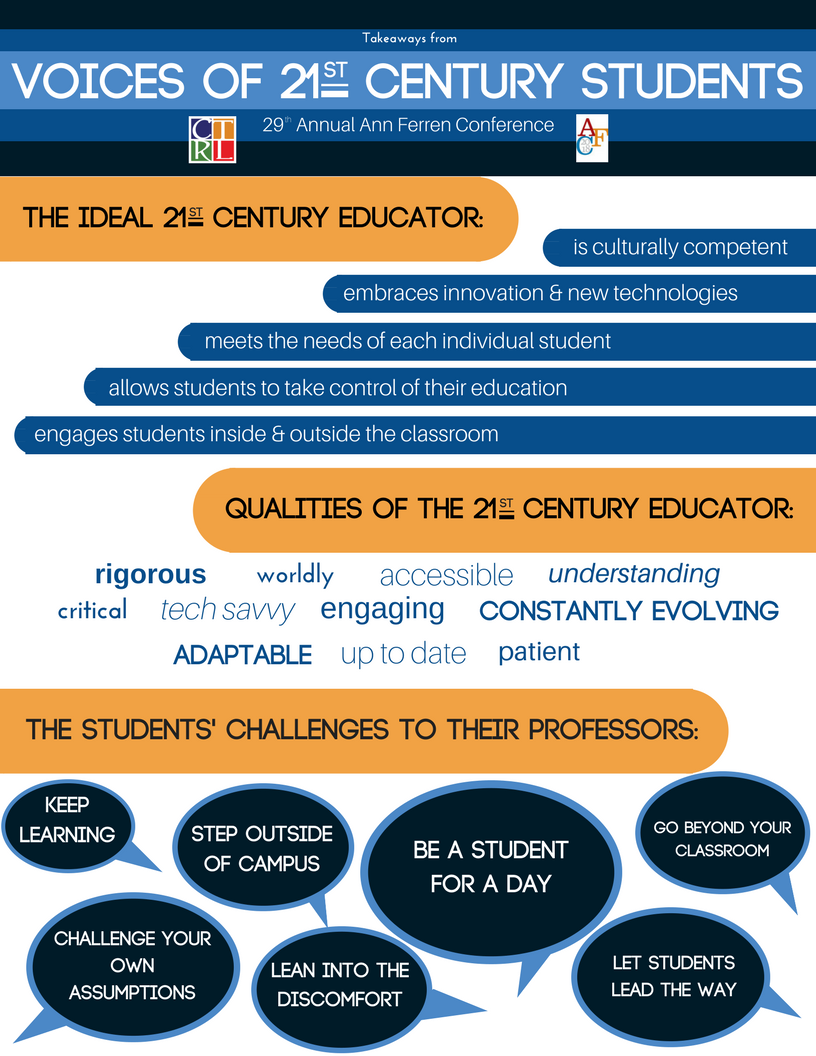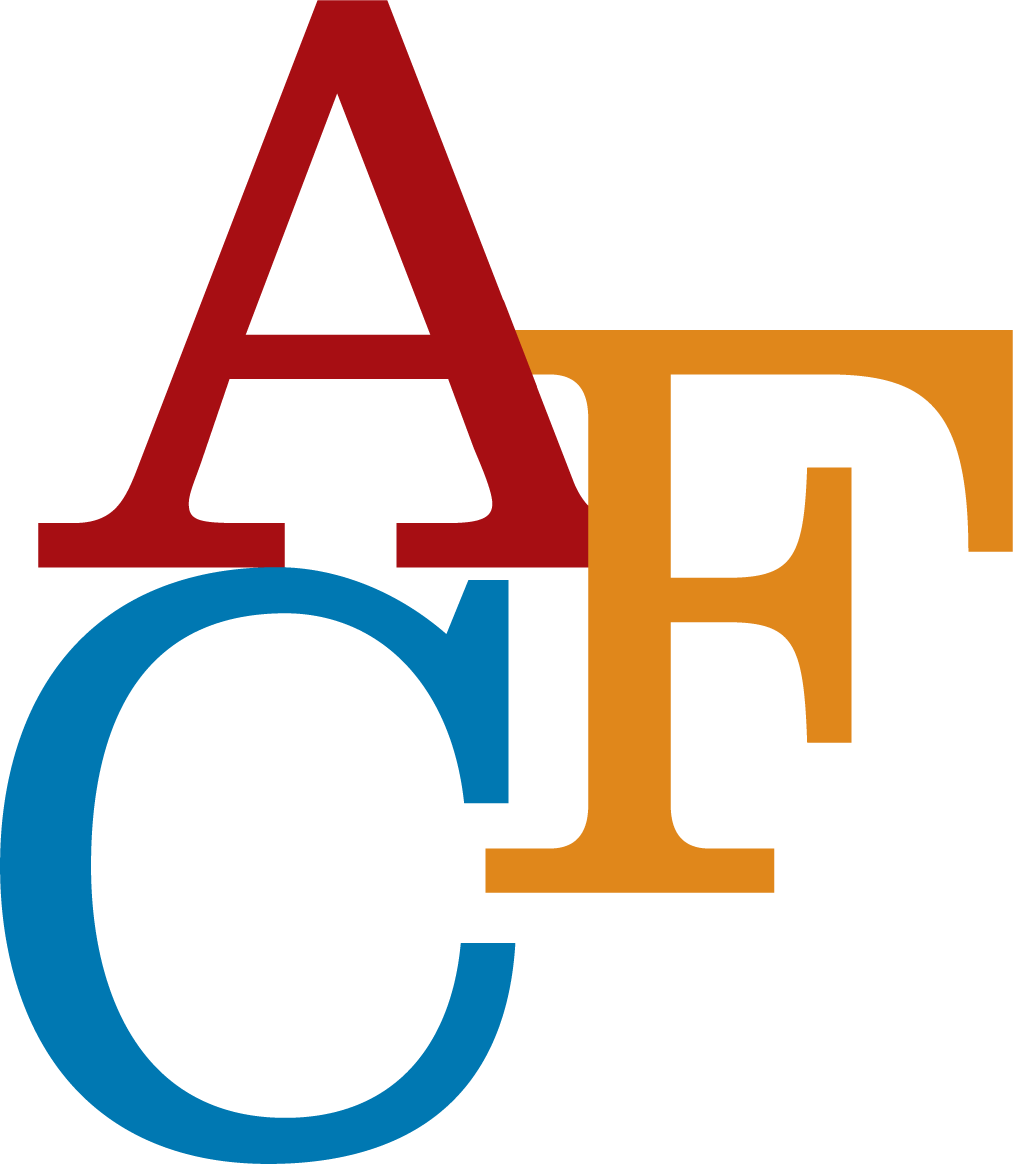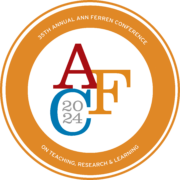Morning Plenary
8:30 a.m. – 9:15 p.m.
Mary Graydon Center 2-5
In “Voices of 21st Century Students,” we will hear students from all areas of the university share their perspectives and prompts us to consider our roles and responsibilities as 21st Century Educators.

Leave a Reply
Want to join the discussion?Feel free to contribute!


Engagement through multiple methods
Get involved with students outside the classroom, get to know who they are, teach in different ways to reach all the students in the classroom, understand how to key into cultural differences and address those in the classroom.
Understanding that technology and social media are an essential part of the work force and need to be effectively used in the classroom
Develop as a faculty just as we ask our students to develop.
Evolving
Professors should continue to learn/evolve and attend student-led events
* We need to effectively support pedagogical paradigms with technological innovations.
* Appreciation of faculty involvement in students’ lives outside the classroom.
* The importance of cultural competence.
Inclusivity in education is key for positive change.
Table Discussion: faculty need to learn, be culturally aware, to understand their students. Faculty should not stagnate. Challenge our own assumptions; be a student for one day- experience the class room from their perspective; review materials from the perspective of first generation, first year students (mind set shift); embrace technology; faculty did not realize that students were getting so little advising (300/advisor) – 76 in the future = amazing; need to adapt to changing demographic of student;
community engagement
faculty need incentives/personal motivation to keep innovating;
-Students wanting increased and more effective use of tech
– Students wanting education to extend beyond the classroom, both in terms of how they AND their professors engage with one another and with the larger community
– An ideal prof who is open to learning, to challenging their own assumptions, to innovate
The 21stC educator is proactive, accessible and practical.
The 21stC educator is engaged and culturally competent.
Innovation
Accessibility
Evolution/ growth
They seem to be asking for mutual respect
Innovation
Technology
Transformational mentorship touches each of these salient themes for the 21st educator. The knowledge and courage to change educational paradigms often emerges from what Paolo Friere would call a pedagogy of a freedom that emerges when we are open to knowledge sharing across status quo boundaries. When we teach to transgress, as bell hooks would encourage us all to do, we model through our actions and mentor students to embrace education as a civic engagement in the real world beyond the four walls of the classroom or firewall of the online learning platform. Innovative approaches may be supported by technology as we embrace new modes of teaching and learning.
Relevancy
Adaptability for teachable movements
The group identified using technology and keeping up with technological innovation in the classroom and getting to know students outside the classroom and find ways to develop a greater sense of trust with students.
Desire for students to have learning outside the classroom, being around and more office hours. They like to see faculty on campus, in hallways, part of the community more. Shifting in paradigm, the long old fashion way of lecturing is gone, no longer applies. Changed from lecturing to discussion and sharing knowledge that is already existing. Biggest takeaway, this idea that you need to adjust your style and not stay the same, you must be able to adapt. Professors have to evolve with the students. Video reveals how high students expectations are, not necessarily demanding in a bad way, but it’s very demanding on professor’s time.
Curious about how our style will change with Generation Z and how will that present new challenges in teaching. We have to figure out how to advance our own learning and they are already so much better prepared than students three or five years ago. Our learning curve is changing. This generation is very techy, ask them to talk or present and they lack verbal skills and discussion. We get a lot of interaction using cell phone but less face to face. We have to use the discussions in class to train them how to articulate their thoughts and develop verbal skills. We have to train them how to interview people and many of them chat with someone or break the ice. They need to learn soft skills.
1. Change and adaptation – a reflection of our theme “Changing Pedagogical Paradigms” – is clearly top-of-mind for students. This means being attuned to change both culturally and technologically.
2. The students clearly value – and desire – being heard and being known and being respected – which we see as a reflection of the theme “The Importance of Mentorship.”
Students crave personal connections and mentorship, and we can help them be the best mentee.
Allow innovation driven by students and be open and humble when it comes to incorporating technology.
Civic engagement is something students crave – engage in it with them!
Challenge our point of view and our students’ point of view.
Technology is a tool.
Students in video wanted faculty to stay up to date and change with the times but faculty didn’t experience this from their students. In fact, they felt they were punished in student evaluations for innovating to n their teaching and challenging students with new concepts and methods.
help to develop critical thinking for students
evolving as educators
Lack of student preparation for class
Negative impact of tech- pace, context, brevity, attention span
Too much focus on internships, business work, focus on doing less; too busy
Our table talked about the importance of a focus on connecting with students. That includes understanding student lives, focusing on students as a person, developing cultural competency. Valuing and rewarding faculty time that does this.
We talked about eliminating barriers to making these connections. One of these barriers is physical space. Places for faculty who live far away to stay on campus overnight to attend events, use already existing facilities like showers so they can bike to work.
Relevancy
Adaptability for teachable movements which can be the most valuable
Critical connection with civic engagement as part of education
Reminder of differing expectations- at times tied to nationality
Educators need to be more involved in activities of students.
Civic engagement.
Importance of mentorship.
Generational differences.
Meaningful experiences.
Education should be about what kind of future society are we creating?
There is some frustration with perceived reduction in support for student tutorials on new
We could try “reverse mentorship opportunities” where more senior students and practitioners could introduce new technologies to students highlighting their practical.
We should have more empathy with students and what they are facing.
It is important to break down barriers between faculty and students interaction, and power dynamics
But it needs to go both ways.
We have lives outside the specific classroom and we are a service provider.
We heard from the video, faculty need to be:
Good with technology and personable
Be more engaged also with community and students
Question our own assumptions:
–Whether our past experiences are relevant.
–That students relate to material the way I do.
–Their previous knowledge.
–Who is the AU student? For example their academic preparation, political orientation, socio- economic status is very different from what it was in past
Importance and challenges of “being up to date” in cultural competence, technology, student needs and your own discipline.
Work with students to engage in learning outside of the classroom. Break down the “sage on a stage” idea of learning and allow students to drive both ideas and solutions. It’s important for faculty to learn new technology and push themselves out of their comfort zone.
the importance of being flexible with students and allowing them to take control of the learning in a way that allows them to grasp the materials they we set out for them to learn.